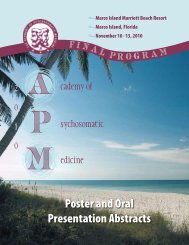Table of Contents - Academy of Psychosomatic Medicine
Table of Contents - Academy of Psychosomatic Medicine
Table of Contents - Academy of Psychosomatic Medicine
Create successful ePaper yourself
Turn your PDF publications into a flip-book with our unique Google optimized e-Paper software.
<strong>of</strong> corticosterone responses to everyday stressors beginning<br />
in early adulthood and enduring across the lifespan.<br />
Among socially isolated rats, corticosterone recovery from<br />
an acute stressor was highly attenuated and associated with<br />
increased progression <strong>of</strong> mammary tumors.<br />
Our study <strong>of</strong>fers the first demonstration <strong>of</strong> nuclear glucocorticoid<br />
receptors in malignant and benign mammary tumors<br />
developing spontaneously, without exposure to a carcinogen<br />
or xenograph. In addition to these findings, we present an array<br />
<strong>of</strong> behavioral measures that suggest that socially isolated<br />
females are a stress and tumor-prone, anxious, neophobic,<br />
and hyper-vigilant phenotype. This animal model then demonstrates<br />
the expression <strong>of</strong> genetic risk in the absence <strong>of</strong> a<br />
social network and identifies mechanisms by which psychosocial<br />
stressors increase growth and malignancy in a wide<br />
variety <strong>of</strong> mammary tumors.<br />
16. Perceived Stress, Anxiety, and Markers <strong>of</strong><br />
Endothelial Dysfunction in Major Depression:<br />
Effects <strong>of</strong> Treatment<br />
Presenting Author: Edwin Meresh, MD, MPH<br />
Co-Authors: John Piletz, PhD, Zoe Wilson, MD, Santosh<br />
Mathapati, MD, Angelos Halaris, MD, PhD, Christopher<br />
Lowden<br />
Purpose: Cardiovascular disease (CVD) and depressive illness<br />
are two <strong>of</strong> the world’s leading health problems. There<br />
are known physiological responses to stress and depression<br />
(1). Repeated episodes <strong>of</strong> stress, anxiety, and depression<br />
can lead to chronic inflammatory processes culminating<br />
in atherosclerosis and cardiovascular diseases. We have<br />
conducted a study to determine whether otherwise healthy<br />
subjects in an acute episode <strong>of</strong> major depression, first or<br />
recurrent, display endothelial dysfunction (assessed with<br />
pulse wave analysis) (2), low heart rate variability, and/or<br />
increased inflammation (3), as reflected in specific plasma<br />
biomarkers, like Interleukin 1beta and 6 (IL1-beta & IL-6), C-<br />
Reactive Protein (CRP), Tumor Necrosis Factor alpha (TNFalpha)<br />
and Monocyte Chemoattractant Protein-1(MCP-1)<br />
before treatment and after treatment with escitalopram for 12<br />
weeks, relative to normal controls. This is an ongoing study.<br />
Methods: This open-label pilot study compared patients with<br />
Major Depressive Disorder (MDD) and matched healthy controls.<br />
The screening assessment (visit 1) included completion<br />
<strong>of</strong> Hamilton Rating Scale for Depression (HAMD), Hamilton<br />
Rating Scale for Anxiety (HAMA) and Perceived Stress<br />
Scale (PSS). Subjects underwent baseline assessment (visit<br />
2) that included blood draw for biomarkers, and pulse wave<br />
analysis (PWA). Pulse wave velocity (PWV) and heart-rate<br />
variability (HRV) were measured in conjunction with a 3-lead<br />
ECG. After completing the baseline assessment, depressed<br />
subjects received escitalopram and were reassessed at<br />
weeks 2, 4, 8, and 12. Escitalopram blood levels were measured<br />
at specified visits. Subjects completed HAMD, and<br />
HAMA at weeks 2, 4, 8 and 12, and PSS at week 12. Subjects<br />
underwent PWA at weeks 2, 4, 8 and 12 (higher the<br />
score <strong>of</strong> aortic augmentation index, higher the arterial stiffness<br />
indicating endothelial dysfunction), and HRV at weeks<br />
8 and 12. Blood draw for biomarkers after treatment was<br />
done at week 12.<br />
7<br />
Reults: In the MDD group (n=9), mean baseline PSS score<br />
was 51.1, HAMA score was 18, HAMD score was 21.66,<br />
and Aortic Augmentation Index (A-Axl) score was 11.6. In<br />
the healthy control group (n=5) mean PSS score was 29.6,<br />
HAMA score was 1.2, HAMD score was 2.8, and A-Axl<br />
score was 1.4. Statistical and regression analysis will be<br />
presented.<br />
Conclusions: This pilot study indicates that patients with<br />
MDD have increased stress perception, underlying anxiety,<br />
and increased arterial stiffness that may serve as prognostic<br />
markers <strong>of</strong> subclinical cardiovascular disease.<br />
References:<br />
1. Miller GE et al. Clinical depression and regulation <strong>of</strong> the<br />
inflammatory response during acute stress. <strong>Psychosomatic</strong><br />
<strong>Medicine</strong>, 2005 Sep-Oct; 67(5): 679-87<br />
2. Hayward CS et al. Assessment <strong>of</strong> endothelial function using<br />
peripheral waveform analysis: a clinical application, J Am<br />
Coll Cardiol 40 (2002) 521-528<br />
3. Piletz JE, Halaris A et al. Pro-inflammatory biomarkers in<br />
depression: Treatment with Venlafaxine, World J Biol Psychiatry<br />
(2008) Dec 31:1-11.<br />
17. The MMPI-2 Restructured Form in<br />
an Epilepsy Monitoring Unit Population-<br />
Preliminary Data<br />
Presenting Author: David Osborne, PhD<br />
Co-Authors: Dona Locke, PhD, Kristin Kirlin, PhD, Duane<br />
Hurst, PhD, Katherine Noe, MD, PhD, Joseph Drazkowski,<br />
MD, Joseph Sirven, MD<br />
Background: Personality assessment is a routine part <strong>of</strong><br />
evaluation <strong>of</strong> patients admitted for long-term video-EEG<br />
monitoring. The MMPI-2 has been well studied in this context.<br />
(Cragar, et al. ,2003) The MMPI-2-RF (Ben-Porath and<br />
Tellegen, 2008) includes restructured clinical scales, which<br />
were designed to remove overlap between scales, as well as<br />
new scales to assess specific problems. No research has<br />
appeared on the MMPI-2-RF in an EMU cohort.<br />
Purpose: To provide preliminary data on the MMPI-2-RF<br />
along with presentation <strong>of</strong> the original MMPI-2 clinical scales<br />
in a prospective EMU cohort with confirmed diagnosis <strong>of</strong> epilepsy<br />
or psychogenic non-epileptic events (PNES).<br />
Methods: Comparison <strong>of</strong> epilepsy (n=11) and PNES (n=11)<br />
patients on the MMPI-2-RF.<br />
Results: Groups were equivalent on age, education, and<br />
gender in this small preliminary sample. Results show significant<br />
differences (p



